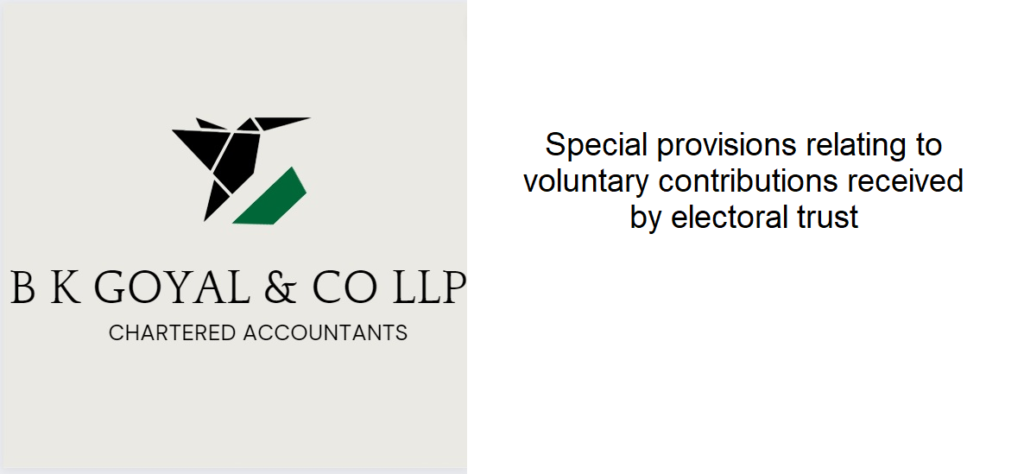Electoral trusts, which were established to foster transparency in political funding in India, receive voluntary donations from contributors. These donations are subsequently allocated to political parties or candidates to cover expenses related to elections. The Income Tax Act’s Section 13B outlines specific provisions regarding the voluntary contributions that electoral trusts receive, which we will discuss in depth.
Under Section 80GGB of the Income Tax Act, 1961, donors who contribute to an electoral trust are eligible for tax exemption. The entire sum of the donation is deducted from the donor’s taxable income. However, the trust must provide the donor with a donation certificate that meets the prescribed format.
Electoral trusts are exempt from paying income tax under Section 11 of the Income Tax Act, 1961. Nevertheless, they must submit their annual returns to the income tax department in the format specified.
Electoral trusts are prohibited from accepting contributions from foreign sources or any company that generates more than 7.5% of its income from government contracts. The maximum amount that can be accepted from a single donor is Rs. 20 crores.
Electoral trusts must distribute at least 95% of the contributions received to political parties or candidates within a stipulated period. The trust is also obliged to maintain a record of the contributions received and the disbursements made.
Electoral trusts must operate with complete transparency. They must file an annual report with the Election Commission of India that includes information about the contributions received and the disbursements made. The report must be available for public scrutiny.
In summary, Section 13B of the Income Tax Act, 1961 provides specific provisions for voluntary donations received by electoral trusts. These provisions aim to improve transparency in political funding by providing tax exemptions for donors and electoral trusts, limiting contributions, specifying requirements for disbursement of funds, and mandating transparency in the functioning of electoral trusts. These measures have contributed significantly to enhancing the transparency and accountability of political funding in India.
section 13B of Income Tax Act, 1961
Any voluntary contributions received by an electoral trust shall not be included in the total income of the previous year of such electoral trust, if—
(a) such electoral trust distributes to any political party, registered under section 29A of the Representation of the People Act, 1951 (43 of 1951), during the said previous year, ninety-five per cent of the aggregate donations received by it during the said previous year along with the surplus, if any, brought forward from any earlier previous year; and
(b) such electoral trust functions in accordance with the rules99 made by the Central Government.
Services of B K Goyal & Co LLP
Income Tax Return Filing | Income Tax Appeal | Income Tax Notice | GST Registration | GST Return Filing | FSSAI Registration | Company Registration | Company Audit | Company Annual Compliance | Income Tax Audit | Nidhi Company Registration| LLP Registration | Accounting in India | NGO Registration | NGO Audit | ESG | BRSR | Private Security Agency | Udyam Registration | Trademark Registration | Copyright Registration | Patent Registration | Import Export Code | Forensic Accounting and Fraud Detection | Section 8 Company | Foreign Company | 80G and 12A Certificate | FCRA Registration |DGGI Cases | Scrutiny Cases | Income Escapement Cases | Search & Seizure | CIT Appeal | ITAT Appeal | Auditors | Internal Audit | Financial Audit | Process Audit | IEC Code | CA Certification | Income Tax Penalty Notice u/s 271(1)(c) | Income Tax Notice u/s 142(1) | Income Tax Notice u/s 144 |Income Tax Notice u/s 148 | Income Tax Demand Notice
